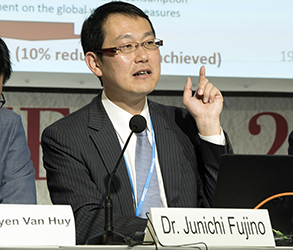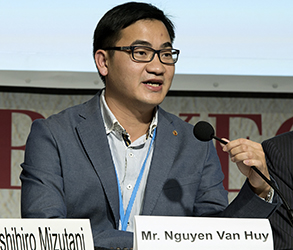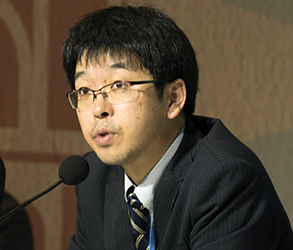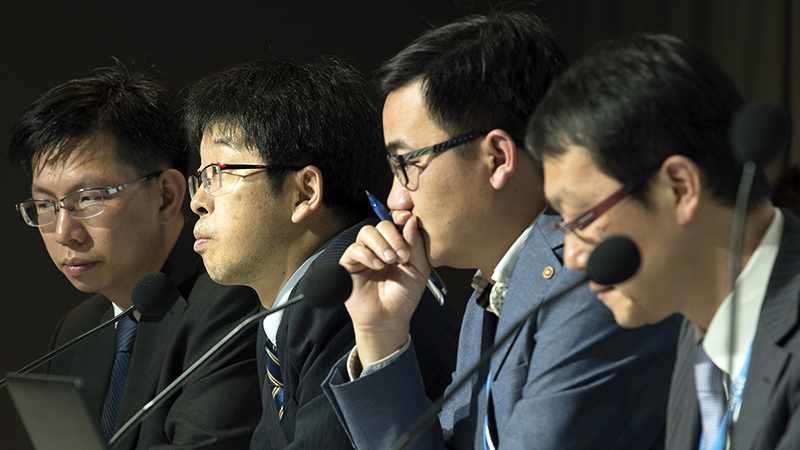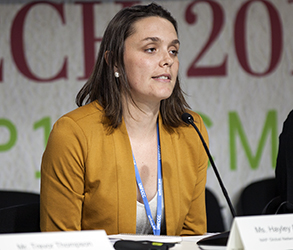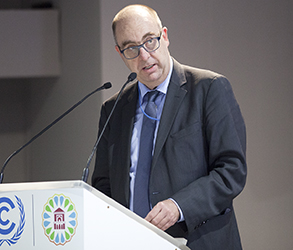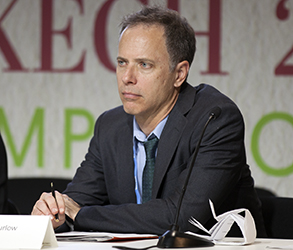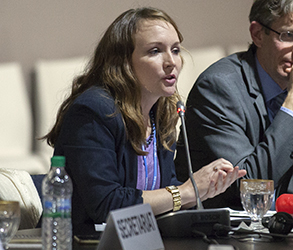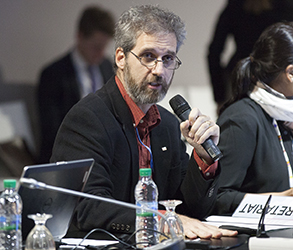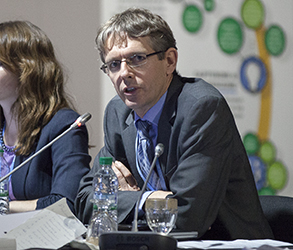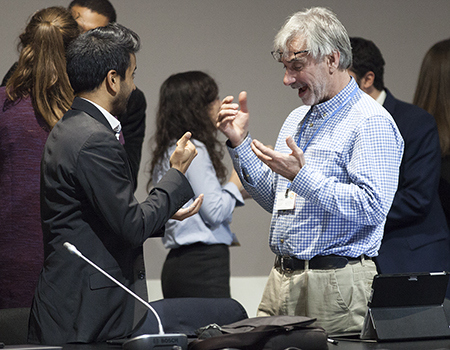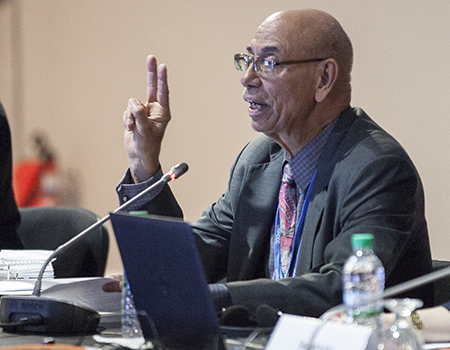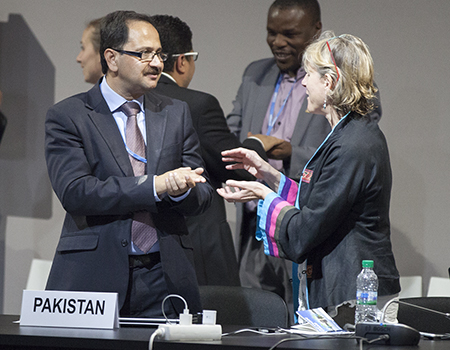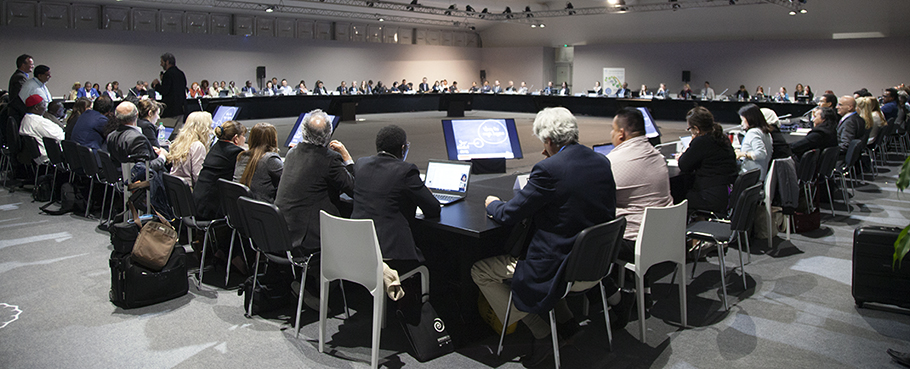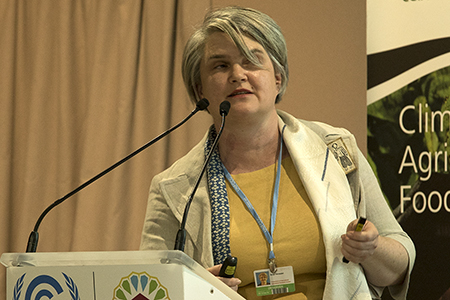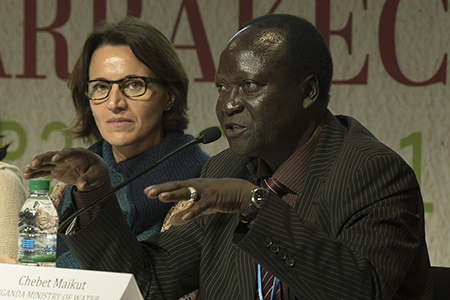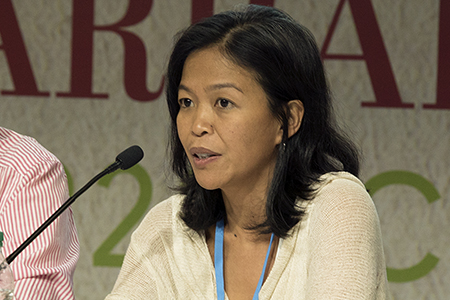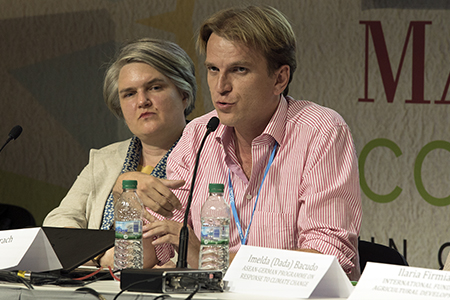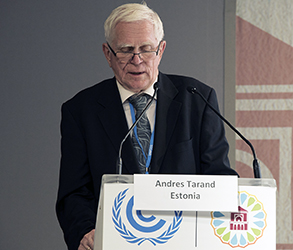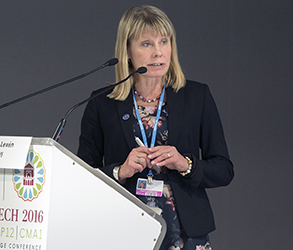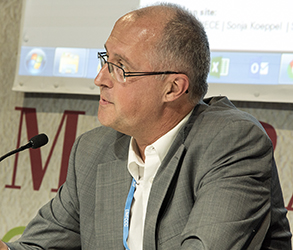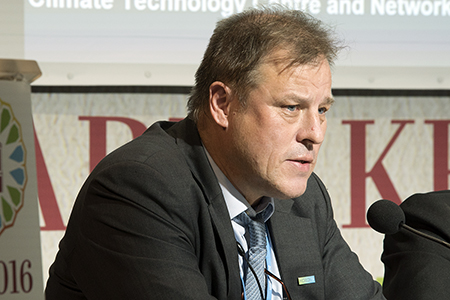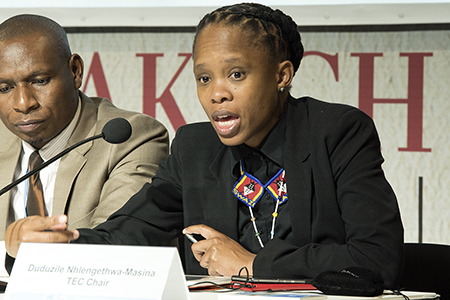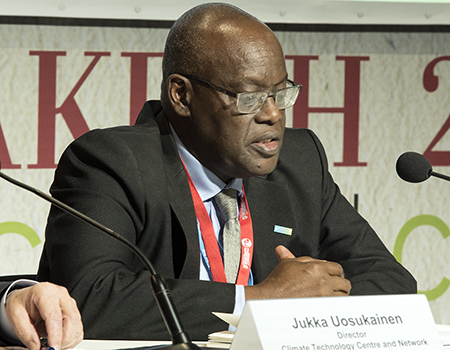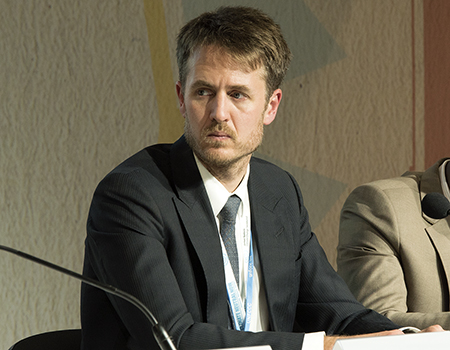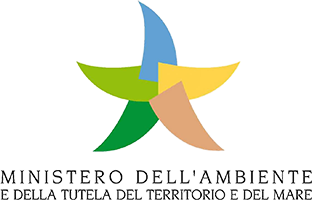Summary
The following side events were covered by ENBOTS on Wednesday, 9 November 2016:
- Promoting Low Carbon Asia for the Paris Agreement: Cases of National and Local Experience on Nationally Determined Contribution (NDC) Activities and Market Mechanisms
- Paris Implementation: Sustained Peer Learning, Coordination and Support in the National Adaptation Plan (NAP) Global Network
- 10th Focal Point Forum of the Nairobi Work Programme (NWP) on “Health and Adaptation”
- Economic Advantage of Agriculture in Nationally Determined Contributions (NDCs)
- Hydroclimate Services for All
- The UN Framework Convention on Climate Change (UNFCCC) Technology Mechanism: Enhancing Climate Technology Development and Transfer
IISD Reporting Services, through its ENBOTS Meeting Coverage, is providing daily web coverage from the Marrakech Climate Change Conference - November 2016.
Photos by IISD/ENB | Mike Muzurakis and Liz Rubin
For photo reprint permissions, please follow instructions at our Attribution Regulations for Meeting Photo Usage Page
Promoting Low Carbon Asia for the Paris Agreement: Cases of National and Local Experience on Nationally Determined Contribution (NDC) Activities and Market MechanismsPresented by the National Institute for Environmental Studies (NIES)
Moderated by Junichi Fujino, NIES, this side event considered city climate change action plans and city-to-city collaboration through the Joint Crediting Mechanism (JCM) and utilization of the Asia-Pacific Integrated Model (AIM).
Opening the session, Ho Chin Siong, University of Technology Malaysia, and Yoshihiro Mizutani, Ministry of the Environment, Japan, introduced the discussion on the feasibility and implementation of low carbon development projects in Asia, particularly in cities.
Ranping Song, World Resources Institute (WRI), suggested that successful implementation of NDCs include commitments across sectors and from non-state actors, who engage in cooperative actions. Providing several examples, he highlighted that over 1,700 cities have joined the Global Covenant of Mayors.
Mizutani called cities “essential non-state actors to tackle climate change” and identified city-to-city collaboration in the Asian region as a useful tool to roll out low carbon technology via the JCM.
Describing a memorandum of understanding between the Governments of Japan and Viet Nam to support low carbon development, Nguyen Van Huy, Ministry of Natural Resources and Environment, Viet Nam, said cities play an important role in implementing the NDCs, and highlighted a partnership between Osaka, Japan, and Ho Chi Minh City, Viet Nam.
Datuk Hj. Sahrom bin Ujang, Kuala Lumpur City Hall, Malaysia, presented the Kuala Lumpur Low Carbon Society 2030 Blueprint, which addresses, inter alia: transportation, including rail, bike and pedestrian systems; infrastructure and digital technology; energy, including a focus on addressing energy efficiency and public transportation; and open green spaces.
Ho Chin Siong asked how to move from planning to implementation of the NDCs, and called for urban policy and design to be backed by science. Recognizing that while cities are significant emitters of greenhouse gases (GHGs), he underscored that they need to also remain competitive and serve as engines of growth, and urged for decoupling carbon emissions and economic growth.
Calling for a holistic approach and new research focused on societal engagement, Boyd Dionysius Joeman, Iskandar Regional Development Authority, Malaysia, presented a green economic guideline to support businesses in transitioning to low carbon development.
The ensuing discussion addressed, inter alia: the citizens' climate pledge; how to engage the private sector, including architects and planners, in low carbon city development; the role of education; and science-based target setting.
From L-R: Ranping Song, WRI; Yoshihiro Mizutani, Ministry of the Environment, Japan; Nguyen Van Huy, Ministry of Natural Resources and Environment, Viet Nam; Junichi Fujino, NIES; Ho Chin Siong, University of Technology Malaysia; Datuk Hj. Sahrom bin Ujang, Kuala Lumpur City Hall, Malaysia, and Boyd Dionysius Joeman, Iskandar Regional Development Authority, Malaysia
Junichi Fujino, NIES, asked how city-to-city cooperation in the Asian region could enhance the implementation of low carbon development strategies.
Suggesting a stronger focus on city-to-city cooperation, Nguyen Van Huy, Ministry of Natural Resources and Environment, Viet Nam, said that GHGs could be reduced via large-scale investments in technology transfer, urban planning strategies and knowledge transfer.
Recognizing that more than 70% of CO2 emissions originate in cities, Yoshihiro Mizutani, Ministry of the Environment, Japan, called cities an “essential non-state actor” to address climate change.
Contacts:
- Junichi Fujino (moderator) | int-unfccc@nies.go.jp
More Information:
- https://seors.unfccc.int/seors/attachments/get_attachment?code=4UTDCU39N4PILBMN3OTM4U5PQRN6PS52
- https://seors.unfccc.int/seors/attachments/get_attachment?code=VY2NK1ATDKEHPOFR31AW6XTB4ADDENW5
Paris Implementation: Sustained Peer Learning, Coordination and Support in the National Adaptation Plan (NAP) Global NetworkPresented by the International Institute for Sustainable Development (IISD) and the Governments of Germany, Grenada and the US
This side event, moderated by Trevor Thompson, Grenada, addressed the work of the NAP Global Network and how it has contributed to effective NAP processes through sustained peer learning, coordinated bilateral support and targeted technical assistance.
Frank Fass-Metz, Germany, provided opening remarks, noting that the NAP Global Network is becoming renowned for providing support and being an information leader in NAP processes. He stressed that the Network will also be beneficial for Nationally Determined Contributions (NDCs) implementation, underscoring increased bilateral interest for supporting the Network.
Hayley Price-Kelly, IISD and NAP Global Network Coordinator, outlined the work, activities and results of the Network. She said that it aims to facilitate sustained peer learning and exchange on challenges and opportunities associated with NAP processes, support national-level action and enhance bilateral support for adaptation.
Martina Duncan, Grenada, provided an overview of the NAP process and the support provided by the Network. She said lessons learned include that: prioritization is key; timeframes must be realistic and manageable; NAP processes must have ownership outside of environment departments; NAPs should be linked to national planning; NAPs can be used to approach donors; resource mobilization needs to be a key pillar of NAPs; and political incentives should be created for mainstreaming.
Price-Kelly then moderated a panel discussion. John Furlow, US Agency for International Development (USAID), stated that the Network has informed US approaches on adaptation, connected non-climate programmes with NAP processes and formed closer connections with other bilateral donors and development agencies.
Laureta Dibra, Albania, said the Albanian NAP process allowed them to understand that national adaptation planning is a long-term process involving different sectors across different levels. She noted that the NAP process aided in identifying national climate risks, and that they are now working on developing a financing strategy.
During the ensuing discussion, participants discussed how the Grenada NAP process aligns with NDCs; approaches to prioritize funding; engaging the private sector; and measuring the success of capacity building.
From L-R: Hayley Price-Kelly, IISD; Martina Duncan, Grenada; John Furlow, USAID; and Laureta Dibra, Albania.
Hayley Price-Kelly, IISD and NAP Global Network Coordinator, outlined the Network’s niche areas, including coordination of NAP processes and providing bilateral support to developing countries.
Frank Fass-Metz, Germany, said that the early entry into force of the Paris Agreement shows that there is great momentum to advance on mitigation and adaptation.
John Furlow, USAID, said that one of the results of the NAP Global Network is that the US is able to show missions how to connect efforts in agriculture, tourism and other sectors within NAP processes.
Contacts:
- Hayley Price-Kelly | hprice-kelly@iisd.ca
- Martina Duncan | martinacduncan@gmail.com
More Information:
10th Focal Point Forum of the Nairobi Work Programme (NWP) on “Health and Adaptation”Presented by the UN Framework Convention on Climate Change (UNFCCC)
This side event, moderated by Pablo Suarez, Red Cross/Red Crescent Climate Centre, focused on the NWP, which contributes to advancing adaptation action through knowledge in the post-Paris regime in order to scale up adaptation at all levels, with a focus on developing countries. Activities under the NWP involve close collaboration with a network of over 320 organizations working on adaptation all over the world. The NWP provides knowledge support to Parties, as well as to the Adaptation Committee and the Least Developed Countries (LDCs) Expert Group (LEG). The NWP also facilitates science-policy-practice collaboration in closing adaptation knowledge gaps, synthesizes and disseminates information and knowledge on adaptation, and fosters learning to boost adaptation actions, including through the Adaptation knowledge portal.
Carlos Fuller, Subsidiary Body for Scientific and Technological Advice (SBSTA) Chair, underscored that the 10th Focal Point Forum on health and adaptation provides an excellent opportunity for policy makers, researchers, scientific communities, practitioners and financial institutions, not just to exchange actions that they are engaged in, but to identify areas of strategic collaboration in order to close critical gaps that will help inform adaptation actions addressing the topic of health.
Underscoring the importance of innovation, Suarez explained the interactive part of the Forum, noting the expectations, namely to gain a shared understanding of the activities undertaken with respect to health, and to discuss new actions.
Diarmid Campbell-Lendrum, World Health Organization (WHO), provided an overview of the interlinkages between climate change and health, included in the NWP. He highlighted, inter alia: health risks sensitive to climatic conditions, including extreme weather events, malaria, diarrhea and under-nutrition; projected changes in health impacts due to climate change; projected changes in disease distribution; direct and indirect health effects; risk of emerging infections; and temperature and productivity changes. Noting that health adaptation “does not start from scratch,” Campbell-Lendrum highlighted the increasing number of adaptation projects worldwide.
Tiffany Hodgson, UNFCCC Secretariat, provided an overview of the parties’ submissions. She highlighted emerging concerns, including geographical distribution of vector-borne and waterborne diseases, as well as malnutrition and disaster impacts.Hodgson further identified main challenges, namely surveillance and early-warning systems, knowledge on the climate-health nexus, intersectoral and transboundary engagement, implementation and funding, and capacity building and awareness raising.
Underscoring the insufficient understanding of the climate change impacts on health, Barney Dickson, UN Environment, highlighted the Lima Adaptation Knowledge Initiative, which aims to identify key adaptation knowledge gaps and facilitate action to address them.
During an interactive discussion during the second part of the event, participants identified health problems related to climate change and engaged in finding innovative actions to address them, including the responsible agent to perform those actions. Numerous actions were identified and transmitted to SBSTA Chair Fuller, who stressed the importance of new models and innovative ideas to support adaptation knowledge and action. The LEG highlighted the importance of coordination of all related actors to achieve the objective of the NWP. Underscoring the low level of awareness of the importance of vulnerabilities posed by climate change, the Consultative Group of Experts (CGE) stressed its role in building capacities and raising awareness.
Focusing on parties’ submissions, Tiffany Hodgson, UNFCCC Secretariat, underscored emerging concerns, and identified gaps and actions on the ground.
Pablo Suarez, Red Cross/Red Crescent Climate Centre, facilitated the event and the interactive dialogue, urging participants to “do things in new ways.”
Noting links between climate change and health, Diarmid Campbell-Lendrum, WHO, used the example of diarrheal disease, which is related to variations in temperature and precipitation, over both space and time.
Carlos Fuller, SBSTA Chair, underscored the opportunity to ensure that the NWP is “fit-for-purpose” to support the adaptation regime.
Contacts:
- Rojina Manandhar (Coordinator)
| RManandhar@unfccc.int
More Information:
Economic Advantage of Agriculture in Nationally Determined Contributions (NDCs)Presented by the Consortium of International Agricultural Research Centers (CGIAR) Research Program on Climate Change, Agriculture and Food Security (CCAFS), the International Fund for Agricultural Development (IFAD) and the International Center for Tropical Agriculture (CIAT)
Laurie Goering, Thomson-Reuters Foundation, moderated the side event, which examined new financial evidence and analysis on the likely returns on investment for smallholder farmers. She underscored that most countries have agriculture as part of their NDC and called for corresponding financial support in this sector.
Sonja Vermeulen, CCAFS, introduced a report titled, “The Economic Advantage: Assessing the Value of Climate-Change Actions in Agriculture.” She summarized the report’s main findings that, inter alia: economic and financial assessments are valuable tools to support decision making; there is a need to mainstream economic assessments in development and climate policies, including in agriculture; and there is a need for a mix of farm- and landscape-level actions, including for capacity building and policy work. She presented several case studies, underscoring the socio-economic benefits of new climate technologies and techniques for agricultural production.
Stating that agriculture is the "life span" of the Ugandan people, Chebet Maikut, Ministry of Water and Environment, Uganda, explained that agriculture is a key sector in the Ugandan climate policy and is included in the country’s NDC. He said addressing agriculture has several co-benefits, including mitigation and adaptation, as well as gender mainstreaming and human rights.
Stating that many agricultural studies do not take into account the “heterogeneity of populations” when offering advice, Peter Läderach, CIAT, proposed matching suggested interventions with the correct farm typologies, for example: considering whether farmers can afford particular suggested climate strategies; and remembering gender considerations in terms of who is in charge of farming and who takes decisions.
Imelda (Dada) Bacudo, Association of Southeast Asian Nations (ASEAN) - German Programme on Response to Climate Change, called for better coordination between different ministries, including on finance, planning and agriculture, to ensure that climate finance is directed towards agriculture.
Expressing commitment to work with and strengthen farmers’ associations, including women’s cooperatives, Ilaria Firmian, IFAD, stated the existence of multiplier effects include the uptake of better practices.
The ensuing discussion addressed, inter alia: the need to further study how much investment is required; the competition for investment between agriculture and other sectors; how agriculture can deliver on investment and offer co-benefits; nature-based agriculture; the low number of Nationally Appropriate Mitigation Actions (NAMAs) in agriculture; risk transfer mechanisms and insurance for the impacts of climate change on agriculture; the inclusion of food trees in climate smart agriculture (CSA) and capacity building to ensure investments pay off.
From L-R: Laurie Goering, Thomson-Reuters Foundation; Sonja Vermeulen, CCAFS; Peter Läderach, CIAT; Imelda (Dada) Bacudo, ASEAN-German Programme on Response to Climate Change; Ilaria Firmian, IFAD; and Chebet Maikut, Uganda Ministry of Water and Environment
Underscoring that there are impacts of climate change which result in significant financial losses to the agricultural sector, Sonja Vermeulen, CCAFS, shared studies where agricultural investments can lower greenhouse gases (GHG) emissions and improve productivity.
Chebet Maikut, Uganda Ministry of Water and Environment, cautioned against the costs of inaction in the agricultural sector, affected by climate change.
Imelda (Dada) Bacudo, ASEAN-German Programme on Response to Climate Change, said that translating the NDCs into action is a question of financing.
Peter Läderach, CIAT, acknowledged the need to “go to the field” to understand the reality of what farmers need to address climate change.
Contacts:
- Carolina Jaramillo (coordinator) | c.jaramillo@cgiar.org
- Vanessa Meadu (coordinator) | v.meadu@cgiar.org
More Information:
- www.ifad.org/documents/10180/7e3dff00-db38-40c6-a2a1-672ff84a0526
- ccafs.cgiar.org/cop22-side-event-economic-advantage-agriculture-ndcs#.WCN_RvmLQ2x
Hydroclimate Services for AllPresented by UN Water
This session was opened by Johannes Cullman, World Meteorological Organization (WMO), and moderated thereafter by Karin Lexén, Stockholm International Water Institute (SIWI).
In a keynote address, Andres Tarand, former Prime Minister, Estonia, noted that viable information on water affects national, regional and international decision making on disaster risk management (DRM), health and the environment. He drew attention to mounting global water stresses which pose threats to peace and security, noting that competition for scarce water resources will increase in frequency. He stressed the need for a strong political message on hydroclimate services to address the challenges of climate change, security and development.
Irfan Tariq, Ministry of Climate Change, Pakistan, spoke on the value addition of hydroclimate services, noting that in times of floods there is a need to redirect flood waters to areas where water is most needed. In order to improve hydroclimate services for users, he stressed the need to understand their needs through, inter alia, social media and mobile phone interactions.
Hanadi Awadallah, Department of Afforestation and Reforestation, Sudan, stressed the need for hydroclimate services in the preparation of inter-ministerial national communication data to warn the population of future periods of water decline. She called for greater support for hydroclimate research, more sophisticated meteorological stations in the country and capacity building on the use of hydroclimate services.
Stefan Rösner, German Meteorological Service, stressed the importance of meteorological data informing hydrological planning processes. He noted the need for institutions and capacities to provide hydroclimate services, as well as the administrative authority to provide them. He drew attention to regional climate centers, but noted the need for trained staff to run these centers.
Ali Subah, Ministry of Water and Irrigation, Jordan, highlighted water scarcity in his country which is further impacted by the current refugee crisis, noting that the biggest challenge is drinking water. Subah then described a national water information system that includes all the data necessary for decision making for a wide range of sectors, noting the role of, and challenges posed by, transboundary water sources.
Demetrio Innocenti, Green Climate Fund (GCF), said that access to GCF funds is through accredited entities, and noted that many adaptation projects focus on hydrological-meteorological issues. He said that the GCF looks for projects that can generate transformational change but also those that can be operationalized and that are useful for the communities in which they are implemented.
In the ensuing discussion participants addressed, inter alia: how hydroclimatic services can be made accessible to users; and the need for accessible GCF financing for adaptation and mitigation. Carol Chouchani Cherfane, UN Economic and Social Commission for Western Asia (ESCWA), closed the session.
Andres Tarand, former Prime Minister, Estonia, stressed the need for policymakers to understand the role of hydroclimate services in meeting the Sustainable Development Goals (SDGs).
Karin Lexén, Stockholm International Water Institute (SIWI), moderated the event.
Stefan Rösner, German Meteorological Service, noted the need for meteorological services to complement hydrological services.
Contacts:
- Sonja Koeppel (Coordinator) | Sonja.Koeppel@unece.org
- Carol Chouchani Cherfane (Coordinator)| chouchanicherfane@un.org
More Information:
The UN Framework Convention on Climate Change (UNFCCC) Technology Mechanism: Enhancing Climate Technology Development and TransferPresented by UNFCCC
This event was moderated by Asher Lessels, UN Framework Convention on Climate Change (UNFCCC) Secretariat.
Noting that the Technology Mechanism is delivering results, Richard Kinley, Deputy Executive Secretary, UNFCCC Secretariat, cautioned against complacency, noting that the technical assistance needs of developing countries could not be understated. He explained that achieving the goals of the Paris Agreement will be challenging and will require time and “revolutions in climate technologies.”
Duduzile Nhlengethwa-Masina, Technology Executive Committee (TEC) Chair, presented an update on performance and activities of the TEC, such as the TEC Rolling Work Plan for 2016-18. She explained that the TEC is the policy arm of the Technology Mechanism, composed of 20 expert members. She then drew attention to key achievements in climate technology, mitigation, technology needs assessment (TNA) process, and adaptation technologies. Nhlengethwa-Masina noted that, from 2017, the TEC will increase its efforts to support parties in accelerating climate technology development and transfer.
Spencer Thomas, Climate Technology Centre and Network (CTCN) Advisory Board Chair, highlighted references to the Technology Mechanism in the Paris Agreement, such as in relation to the UNFCCC Technical Examination Processes and to linkages with the Financial Mechanism of the Convention. He also expressed the need for support for research, development and deployment.
Jukka Uosukainen, CTCN, described the CTCN's technical assistance by geographical region, objective and scope. He said that technical assistance requests can come from sub-national authorities, so long as they are submitted through the National Designated Entity (NDE). He explained that technological assistance from the CTCN must contribute to the achievement of the Sustainable Development Goals (SDGs) and form the basis for multilateral investment.
Elisha Moyo, CTCN’s NDE of Zimbabwe, shared his country’s experiences on interacting with the CTCN. Noting that Zimbabwe’s Nationally Determined Contribution (NDC) requires various technologies to attain resilience in the agriculture sector, he said Zimbabwe submitted four proposals to CTCN for technical assistance on: agriculture; industrial energy efficiency; capacity building on project planning; and translation of policy into “bankable initiatives.”
In the ensuing discussion, participants addressed, inter alia: urgency to reach “high- and low-hanging fruit” relating to climate technology transfer; clarification on CTCN’s process in selecting partners within a country; technological assistance that supports NDCs; and post-Paris Agreement financial resources to support developing countries in their submission of technical assistance requests to CTCN.
From L-R: Jukka Uosukainen, CTCN; Spencer Thomas, CTCN Advisory Board Chair; Asher Lessels, UNFCCC Secretariat; Elisha Moyo, , CTCN’s NDE of Zimbabwe; and Duduzile Nhlengethwa-Masina, TEC Chair
Jukka Uosukainen, CTCN, drew attention to a project that sought to mainstream gender for a climate-resilient energy system in West Africa.
Duduzile Nhlengethwa-Masina, TEC Chair, said the Committee recommended enhanced financial, technological and capacity building support for the implementation of Technology Acton Plans (TAPs) and updating Technology Needs Assessment (TNAs).
Spencer Thomas, CTCN Advisory Board Chair, said that major concerns identified in party submissions to COP 22 included: the need to build on gains already made by the CTCN; strengthening National Designated Entities and country-level coordination; and private sector engagement.
Asher Lessels, UNFCCC Secretariat, moderated the event
Contacts:
- Asher Lessels
| alessels@unfccc.int
More Information:
About | 7 Nov | 8 Nov | 9 Nov | 10 Nov | 11 Nov | 12 Nov | 14 Nov | 15 Nov | 16 Nov |
17 Nov
|
18 Nov
|
Summary
The Earth Negotiations Bulletin on the Side (ENBOTS) © <enb@iisd.org> is a special publication of the International Institute for Sustainable Development (IISD). This issue has been written by Karen Alvarenga, Katherine Browne, Bo-Alex Fredvik, Tallash Kantai, Jennifer Lenhart, Ph.D., Kate Louw, Miquel Muñoz Cabre, Nicole de Paula, and Asterios Tsioumanis, Ph.D. The Digital Editors are Mike Muzurakis and Liz Rubin. The Editor is Elena Kosolapova, Ph.D. <elena@iisd.org>. The Director of IISD Reporting Services is Langston James “Kimo” Goree VI <kimo@iisd.org>. The opinions expressed in ENBOTS are those of the authors and do not necessarily reflect the views of IISD and funders. Excerpts from ENBOTS may be used in non-commercial publications only with appropriate academic citation. For permission to use this material in commercial publications, contact the Director of IISD Reporting Services at <kimo@iisd.org>. Electronic versions of issues of ENBOTS from the Marrakech Climate Change Conference - November 2016, can be found on the IISD Reporting Services website at http://enb.iisd.org/climate/cop22/enbots/. The ENBOTS Team at the Marrakech Climate Change Conference - November 2016, can be contacted by e-mail at <tallash@iisd.org>.
Specific funding for coverage of the Marrakech Climate Change Conference - November 2016, has been provided by the Ministry of the Environment and Protection of Land and Sea of Italy, and the Kingdom of Saudi Arabia
Specific funding for coverage of side events at the Marrakech Climate Change Conference - November 2016, has been provided by the Ministry of the Environment and Protection of Land and Sea of Italy, the Austrian Federal Ministry of Agriculture, Forestry, Environment and Water Management (BMLFUW), the Swiss Federal Office for the Environment (FOEN), the Kingdom of Saudi Arabia, and the European Union (EU)
IISD Reporting Services is grateful to the many donors of the Earth Negotiations Bulletin (ENB) and recognizes the following as core contributors to the ENB: the European Union, the Government of Switzerland (the Swiss Federal Office for the Environment (FOEN)), the Italian Ministry for the Environment, Land and Sea, and the Kingdom of Saudi Arabia. General Support for the Bulletin during 2016 is provided by the German Federal Ministry for the Environment, Nature Conservation, Building and Nuclear Safety (BMUB), the New Zealand Ministry of Foreign Affairs and Trade, SWAN International, the Finnish Ministry for Foreign Affairs, the Japanese Ministry of Environment (through the Institute for Global Environmental Strategies - IGES), the United Nations Environment Programme (UNEP), and the International Development Research Centre (IDRC). Funding for translation of the Bulletin into French has been provided by the Government of France, the Wallonia, Québec, and the International Organization of La Francophonie/Institute for Sustainable Development of La Francophonie (IOF/IFDD).
Resources for the Marrakech Climate Change Conference - November 2016
- Website for the Marrakech Climate Change Conference - November 2016
- Website for Side Events and Exhibits at the Marrakech Climate Change Conference - November 2016
- Schedule of Side Events at the Marrakech Climate Change Conference - November 2016
- Overview Schedule for the Marrakech Climate Change Conference - November 2016
- Host Country Website
IISD ENB/ENB+ Meeting Coverage
- 44th Session of the Intergovernmental Panel on Climate Change (IPCC-44), 17-20 October 2016, United Nations Conference Centre (UNCC), Bangkok, Thailand
- Bonn Climate Change Conference - May 2016, 16-26 May 2016, Bonn, Germany
- High-Level Signature Ceremony for the Paris Agreement on Climate Change, 22 April 2016, UN Headquarters, New York
- IPCC-43, 11-13 April 2016, Headquarters of the United Nations Environment Programme (UNEP), Nairobi, Kenya
- Paris Climate Change Conference - November 2015, 29 November - 13 December 2015, Paris, France
- Coverage of Side Events at the Paris Climate Change Conference - November 2015, 29 November - 11 December 2015, Paris, France
- Bonn Climate Change Conference - October 2015, 19-23 October 2015, Bonn, Germany
- IPCC-42, 5-8 October 2015, Dubrovnik, Croatia
- Bonn Climate Change Conference - August 2015, 31 August - 4 September 2015, Bonn, Germany
- Bonn Climate Change Conference - June 2015, 1-11 June 2015, Bonn, Germany
- Coverage of Side Events at the Bonn Climate Change Conference - June 2015, 1-11 June 2015, Bonn, Germany
- 9th Meeting of the Green Climate Fund (GCF) Board, 24-26 March 2015, Songdo, Republic of Korea
- IPCC-41, 24-27 February 2015, UN Environment Programme (UNEP) headquarters, Nairobi, Kenya
- Geneva Climate Change Conference - February 2015, 8-13 February 2015, Geneva, Switzerland
- Lima Climate Change Conference - December 2014, 1-14 December 2014, Lima, Peru
- Coverage of Side Events at the Lima Climate Change Conference - December 2014, 1-12 December 2014, Lima, Peru
- IPCC-40, 27-31 October 2014, Copenhagen, Denmark
- Bonn Climate Change Conference - October 2014, 20-25 October 2014, Bonn, Germany
- UN Climate Summit 2014 - “Catalyzing Action”, 23 September 2014, UN Headquarters, New York
- Bonn Climate Change Conference - June 2014, 4-15 June 2014, Bonn, Germany
- 12th Session of the IPCC Working Group III (WGIII-12) and IPCC-39, 7-12 April 2014, Berlin, Germany
- Bonn Climate Change Conference - March 2014, 10-14 March 2014, Bonn, Germany
- WGII-10 and IPCC-38, 25-29 March 2014, Yokohama, Japan
- IPCC-37, 14-17 October 2013, Batumi, Georgia
- IPCC-36, 23-26 September 2013, Stockholm, Sweden
Additional IISD Resources
- CLIMATE-L - A Mailing List for News on Climate Change Policy
- SDG Knowledge Hub - An online resource center for news and commentary regarding the implementation of the United Nations’ 2030 Agenda for Sustainable Development, including all 17 Sustainable Development Goals (SDGs)
- Linkages Update - Bi-weekly International Environment and Sustainable Development News
© 2016, IISD Reporting Services. All rights reserved. | Photography Usage

